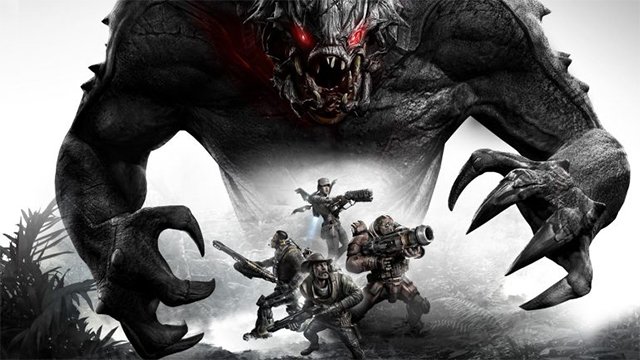Evolve, Turtle Rock Studios’ 2015 asymmetrical multiplayer shooter, had a rough time. Critics enjoyed it but it was weighed down its excessive DLC, slow updates, and aggressive pre-order incentives that gave the perception that it was a bad game. These troubles followed the game until publisher 2K Games recently announced that they were taking the game’s dedicated servers offline in September. This news caused the game’s lead writer Matt Colville to take to Reddit and explain what he thought went wrong with the game.
The game’s “4v1” hook worked well during prototyping, according to Colville’s comment. However, this was mainly due to the team’s enthusiasm to roleplay as the hunters and monsters. When someone on the team snapped and played to win, the game fell apart and “never really recovered.” Breaking the game down into winning and losing opened up the game’s faults.
A good portion of these faults were balancing issues. Since the hunters and monster had different objectives and mechanics, they were effectively playing two separate games. Colville talked about how having two different types of mechanics made developer a lot harder.
“That was a problem we never solved,” stated Colville. “It meant all new content was a colossal pain to implement, forget balance, just implement. Just take this cool idea for a hero or a monster, and implement it. Super hard. Because there was always some other hero or monster ability that borked your stuff.”
Balance issues aside, Colville cites the game’s business model as another point of failure. Evolve‘s co-op nature meant it was made for friends to buy together but its price point didn’t facilitate that mentality. Selling the game at $60 a pop was a mistake according to Colville since it forced groups to pay upwards of $300 to get the full experience. He explains how, since actual co-op really only works with your friends, the game was a hard sell and, sadly, everyone knew.
“So give the game away,” said Colville. “Charge people for cosmetic stuff, but make the game free. Maximize your user-base. We were already thinking about this. We knew this, and THQ knew it. Alas, THQ went tits up.”
The final main issue he listed was their inability to update the game fast enough. Evolve‘s launch numbers were healthy, but, as most popular games discover, those early players discovered a few exploits. Despite having fixes within a day, Turtle Rock was only allowed to patch the game once every three months.
Slow updates and the news stories written about them pushed away players and continued the game’s negative reputation. Colville believed that they could have solved the game’s problems if they could implement live updates. However, Evolve‘s sales and community brought the team joy even if some parts of the game’s development were frustrating.
“That was depressing but a lot of people bought the game and played it,” admitted Colville. “That cheered us up. Tons of fans and fan art and fan sites and even cosplay, but it cost too much so folks who liked it couldn’t get their friends to buy it and we couldn’t update the game to make the people playing it happy.”
His insights into the game’s development confirms some of the perceived theories surrounding the game’s issues. It shows that games can have new ideas but stumble due to poor decisions that are out of the developer’s control. Some can evolve and survive the missteps. Some can’t. And ironically, Evolve couldn’t.







